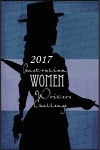
2017, 225p
David Marr, the celebrated biographer, has proclaimed for himself the rule that “biographers should stay out of sight”. I suspect that he would be ‘tut-tutting’ the whole way through this book, because the biographer/author Kerrie Davies is very much on-stage, using her own early 21st century experience as a lens through which to examine and reflect on the marriage and separation of Bertha and Henry Lawson. The book both starts and finishes with Davies’ own reflections on single parenthood and she shuttles back and forth between her own memoir and a biographical examination of Bertha and Henry Lawson.
Henry Lawson, as most (I hope!) Australian readers would know, is one of Australia’s best known writers, with his short story ‘The Drover’s Wife’ forming one of the staples of school anthologies in the last century. He wrote in the 1890s and early 1900s at a time when ‘Australianness’ was being explored in writing through the pages of The Bulletin and through the works of the Australian impressionists – Roberts, McCubbin, Streeton et al. He is a much-biographied subject, as Davies found, with biographers falling into two camps: those who blamed his wife Bertha for pursuing child support payments and hounding him to imprisonment, and those who saw Bertha as the long-suffering, separated wife bringing up her children alone.
Davies falls very much into the second category. She, too, has brought her daughter up alone when her marriage to her musician husband fell apart through his incessant travelling, and this sense of identification with Bertha permeates the book. I’m not sure that it makes good biography, but I don’t know if a ‘pure’ biography was ever her intention. Certainly she draws on primary documents, including court files, letters, memoirs, secondary sources and Henry’s own writings, reproducing important paragraphs in the text itself, and footnoting the sources at the rear of the book. In this way she has certainly given Bertha an identity and agency. She has carefully researched the legislation governing divorce at the turn of the twentieth century, and beautifully integrates Henry, in particular, into the bohemian and literary milieu of the day. However, as a journalist, she makes no claim to be a historian, and in describing the Darlinghurst gaol in which Henry was imprisoned, she turns us over directly to the hands of the archivist at the gaol, Deborah Beck, in a manner reminiscent of meeting-the-historian in ‘Who Do You Think You Are’. In fact, that same sense of anachronistic identification that permeates ‘Who Do You Think You Are’ is evident in this book as well, and it means that as reader, you’re taken along for the story in the present just as much for the history.
Although a very different sort of endeavour, this book evoked for me Jennifer Gall’s Looking for Rose Paterson. There’s a symmetry in that both researchers are drawing an otherwise unseen woman (a mother, a wife) out from the background of these two writers – A. B. Paterson and Henry Lawson- who are together synonymous with colonial nationalistic turn-of-the-century writing. But Bertha Lawson was not unseen: she wrote her own memoir, her correspondence is found amongst Henry’s works, people knew her and she looms large in his lifestory as the force that he resisted and railed against, and which eventually- in the eyes of his champions- brought him undone. The subtitle of the book is “The Untold Story of Bertha and Henry Lawson”, and Davies has succeeded in telling this untold story. “No one is more pleased to see you yourself again than I am” Bertha wrote to Henry (p 185) during one of his recurrent phases of sobriety before lapsing into alcoholism again. In seeing Bertha, and the cycles of alcoholism and cruelty, unsuccessful reconciliations, legal maneuverings, emotional bargaining, justifications and accusation, we see Henry ‘himself’ also.
The author’s paper to the 2015 Australasian Association of Writing Programs conference discussing her writing decisions can be found here. (What a fantastic site! they have all the papers from decades of conferences).
Sourced from: Yarra Plenty Regional Library
My rating: 9/10

I have posted this review to the Australian Women Writers Challenge website.

Thank you for the great review. I appreciated your comment about her approach to describing the prison. I find biographers do tend to be divided between the journalists and the historians, and it’s less common for a journalist to be tackling a historical subject. With so many biographical works relating to Henry Lawson, perhaps she’s more likely to get away with the hybrid memoir approach? Interesting point of comparison is Brian Matthews’ Louisa on Henry’s mother, quite divisive in its experimentation thirty years ago I seem to remember from my reading.
I’ve recently reviewed both Bertha’s memoir of her life with Henry and Matthew’s Louisa. Re divorce, I think Bertha was happy to stay married to Henry as long as he lived somewhere else. I’ll definitely be looking out for this one.
I was wondering why I had bookmarked this review – obviously to remind me to buy the book. Am about to start on Anne Brooksbank’s account of Lawson and Mary Gilmore, so you’ll probably get a link (eventually, I’m struggling to find time to get through physical books).
Pingback: All My Love, Anne Brooksbank | theaustralianlegend